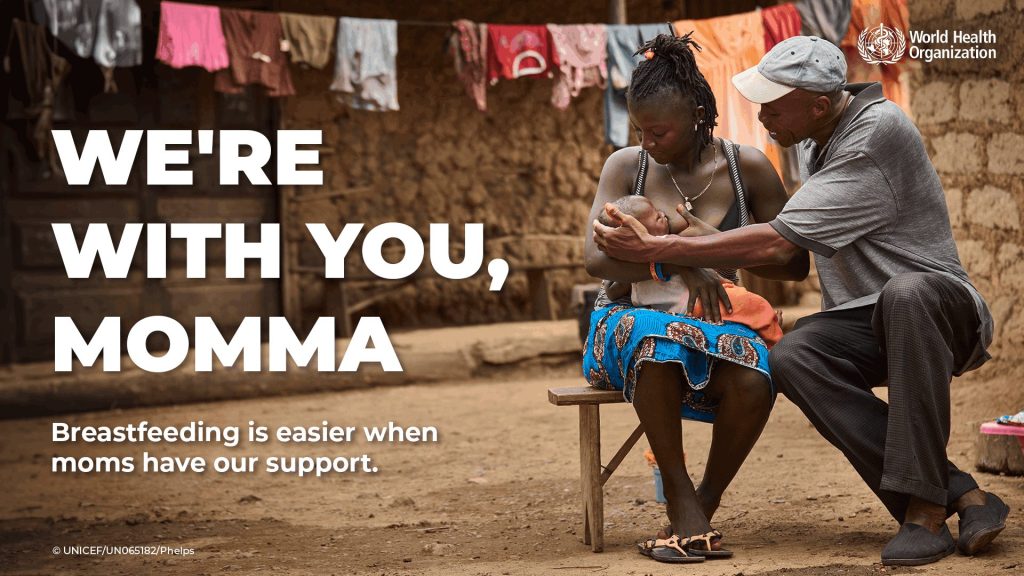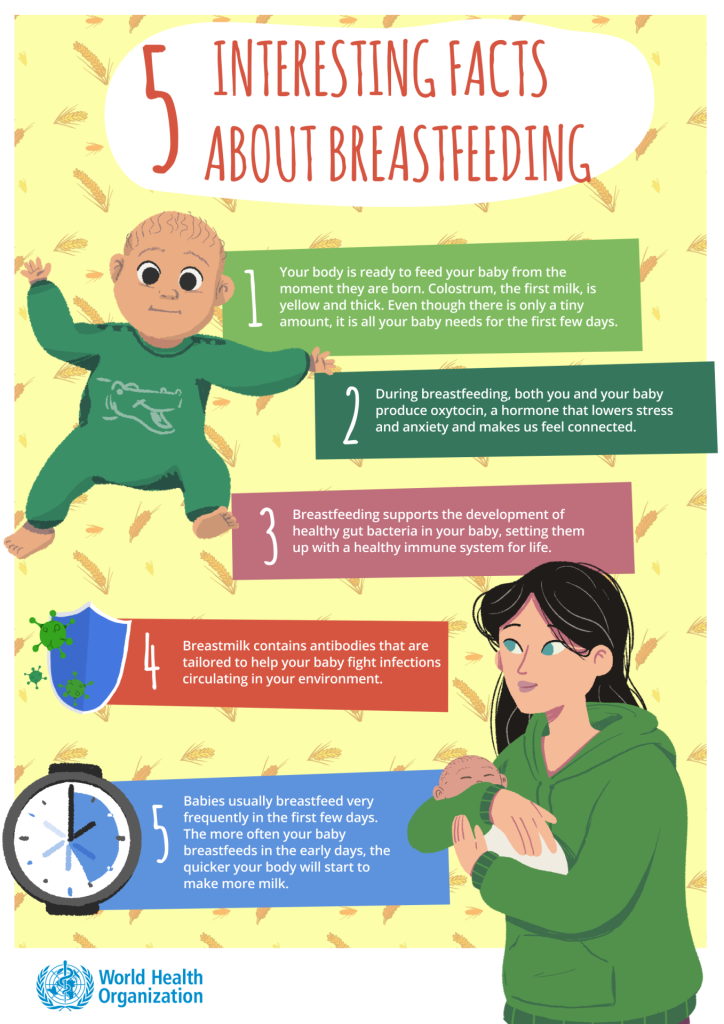
World Breastfeeding Week is held in the first week of August every year, supported by WHO, UNICEF and many Ministries of Health and civil society partners. The theme for 2024 is Closing the gap: Breastfeeding support for all.
The campaign will celebrate breastfeeding mums in all their diversity, throughout their breastfeeding journeys, while showcasing the ways families, societies, communities and health workers can have the back of every breastfeeding mum.
This year we want to really recognize breastfeeding mums, ensure they are seen and heard, and share relatable human experiences about breastfeeding and the importance of multi-level support.
There are actions we can all take that help women to breastfeed as long as they would like.
- This World Breastfeeding Week, let’s appreciate breastfeeding mums and ensure they get the support they need.
- Breastfeeding support comes in many forms – from staff welcoming breastfeeding in your local café to helpful advice from a health worker or maternity protections from your government. These all help protect the health and rights of women and babies.
- Women everywhere have the right to respectful breastfeeding counselling from trained health care providers, as well as laws and policies like maternity leave and provisions like paid time off when you go back to work.
- We can all help ensure women feel able to breastfeed anytime, anywhere – and work to improve the position and condition of women at home, at work and in public life.
WHAT IS NEEDED TO SUPPORT MUMS
- Support for women to breastfeed anytime, anywhere, so that it is normalized and not censured in public life
- Effective maternity entitlements that do not force women to choose between their families and their work
- Trained health professionals who can provide helpful, respectful breastfeeding support
- An end to exploitative baby-milk promotions in all contexts
Benefits of Breastfeeding
Breastfeeding has many benefits for you and your baby. It helps build your baby’s immune system and offers the perfect nutrition. Some of the health benefits to you include a lower risk of breast and ovarian cancer.

What are the benefits of breastfeeding?
Breastfeeding (chest feeding) has many health benefits for you and your baby. Understanding these benefits can help you decide if breastfeeding is right for your family.
Benefits of breastfeeding for baby
Research suggests that breastfeeding lowers your baby’s risk of certain diseases and helps build a strong immune system. Breastfed (chest fed) babies have a lower risk of:
- Diarrhea, vomiting and preterm necrotizing enterocolitis (NEC).
- Respiratory infections like pneumonia, respiratory syncytial virus (RSV) and whooping cough.
- Ear infections.
- Bacterial meningitis.
- Asthma.
- Sudden infant death syndrome (SIDS) and infant mortality.
- Childhood obesity.
- Eczema.
- Type 2 diabetes later in life.
- Leukemia (in childhood).
- Cavities and future orthodontic problems for babies less than one year of age.
- Celiac disease and inflammatory bowel disease (IBD).
Studies show that breastfed infants have a lower hospitalization rate and tend to be in better health. This leads to fewer visits to their pediatrician for sicknesses.
Nutritional benefits of breast milk
Breast milk contains everything your baby needs to grow and develop. It provides a unique and specific formula of vitamins, minerals and antioxidants.
Breast milk supports your baby’s health because it:
- Is easy for their immature tummy and intestines to digest.
- Contains antibodies that protect against infection and boost immunity.
- Has the right amount of fat, sugar, water, protein and vitamins for your baby’s development.
- Promotes healthy weight gain.
- Changes in composition to meet your baby’s nutritional needs over time.
- Contains substances that naturally soothe your baby.
Most healthcare organizations recommend exclusively breastfeeding your baby for at least six months. Once your baby is old enough for solid food, you can introduce foods and continue with breastfeeding for up to two years or longer.
It’s worth noting that if you exclusively pump, your baby is still getting the nutritional and health benefits of breastmilk.
Components of breast milk
There are many components of breast milk that meet your baby’s needs. These include:
- Carbohydrates, such as lactose, which support a healthy balance of bacteria in your baby’s stomach.
- Fats that help your baby’s brain and nervous system develop.
- Proteins, like lactoferrin and secretory IgA, that protect your baby from infections.
- Vitamins that support your baby’s growth.
- White blood cells that help fight infection.
Benefits for mom or breastfeeding parent
Breastfeeding offers several benefits for you, too. In the months after delivery, breastfeeding lowers your risk for postpartum depression if breastfeeding is going well and you feel well-supported. It also benefits you much farther down the road, lowering your risk of developing:
- Breast cancer.
- Ovarian cancer.
- Endometrial cancer.
- Thyroid cancer.
- Osteoporosis.
- Type 2 diabetes.
- Cardiovascular disease.
- High blood pressure.
- High cholesterol.
Besides supporting your long-term health, breastfeeding has many other benefits for you, as well as for your relationship with your baby. These include:
- Quicker recovery from childbirth. Breastfeeding produces the hormone oxytocin. Oxytocin helps your uterus contract after delivery. This helps it return to its normal size and reduces the amount of vaginal bleeding after delivery.
- Increasing physical and emotional bonding. Breastfeeding is a special and unique way to feel connected to your baby. Some researchers have found that the bonding from breastfeeding may help reduce social and behavioral problems in both children and adults.
- Establishing trust. Breastfeeding parents learn to read their infant’s cues, and babies learn to trust caregivers. This helps shape your baby’s early behavior.
- Convenience. You can breastfeed nearly anywhere without worrying about preparing bottles or mixing formula. Your milk is available without needing to bring other supplies.
- Low cost. Breastfeeding may have some initial costs like nursing bras and nipple cream, but it’s more affordable than formula in the long run. The cost of formula can be up to $10 a day depending on the brand, type and amount your baby drinks.
Does breastfeeding help you lose weight?
Breastfeeding may make it easier for you to lose the weight you gained during pregnancy. Breastfeeding burns calories, which can help with weight loss.
But not everyone loses weight from breastfeeding. Researchers aren’t entirely sure why some people lose weight while breastfeeding and others don’t. Several other factors contribute to weight loss/gain, like calorie consumption, physical activity and sleep quality.
Credit: Who, Cleveland Clinic
